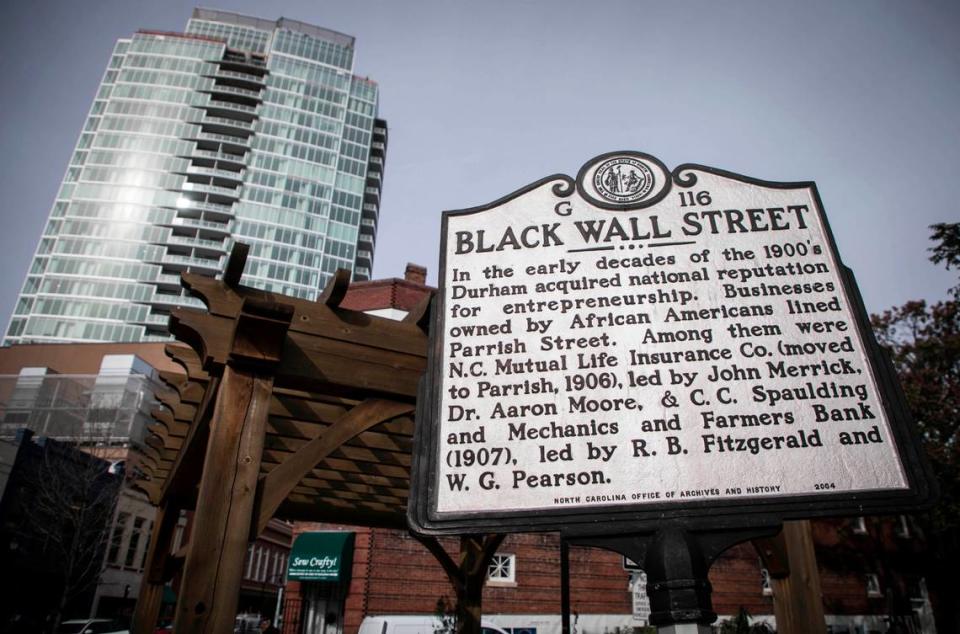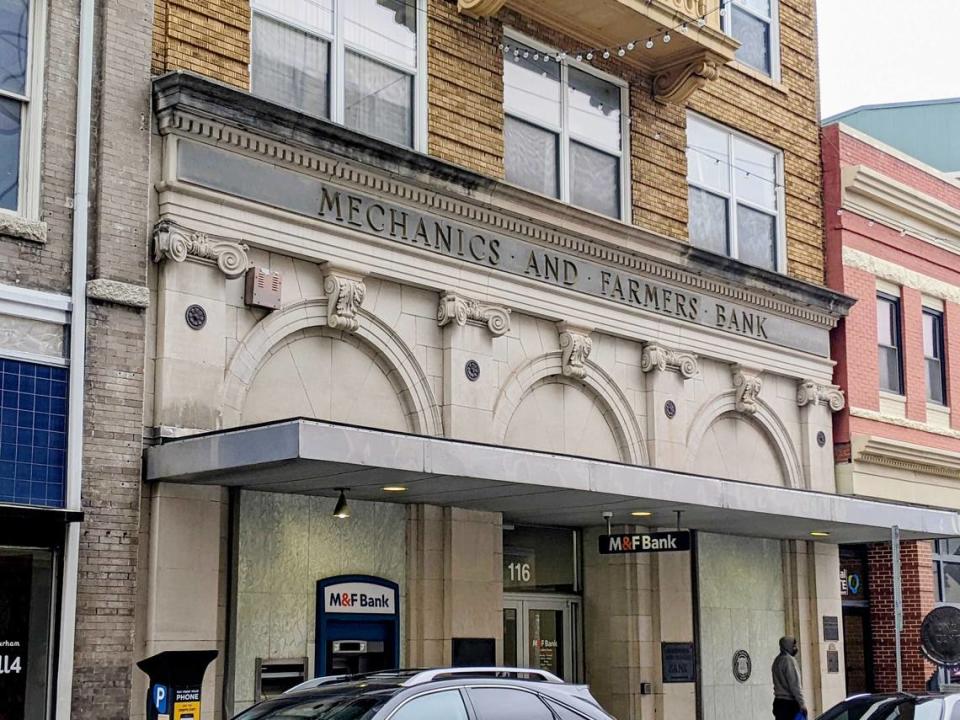Durham’s Black-owned bank needed an upgrade. It found help from the coast
The six-story brick building on Parrish Street harkens to Durham’s past. With a stately neoclassical design, it is a historical landmark and a nod to a section of downtown known throughout the early 20th century as Black Wall Street. Plaques outside its doors tell the narrative of the surrounding neighborhood.
But for all its backstory, the building still houses a functioning bank branch — one its CEO said was recently in need of modernizing.
Established in 1908, M&F Bank (named Mechanics and Farmers Bank until 2015) is the second oldest Black-owned bank in the country. Today it has seven branches across North Carolina, including two each in Raleigh and Durham, where it is headquartered. M&F is one of North Carolina’s few community development financial institutions, a federal distinction that requires it to award at least 60% of its loans to businesses within lower income or minority communities.
“The founders of the bank wanted to make sure there was an institution that served the community, specifically African Americans in the Raleigh-Durham markets,” M&F’s CEO James Sills III said. “That’s where we started. And then we branched out to Charlotte, Winston-Salem and Greensboro.”
Since the bank recorded its first annual net loss in 2016, it has seen profits and asset holdings rebound. Local companies like Pendo and Global Data Consortium deposited millions following the murder of George Floyd in 2020 to support the bank’s mission to reduce the racial wealth gap.

Only 4.7% of Durham business owners are Black, according to a 2021 study from the consumer financial outlet SmartAsset. This is compared to Black residents making up around 35% of the Bull City’s population.
Chandra Brown Hines, a dentist in Durham, said M&F gave her a loan to start her own local practice in 2020 after she was turned down by several larger banks. “M&F was the only one to take the time to sit down and look at the whole story,” she said.
Yet despite his bank’s growth, Sills saw that M&F lagged behind bigger competitors in one key area: technology.
“We had this archaic (banking and loan) platform that was about 15 years old,” he said. In modern banking, this was an unignorable issue. “It’s all technology driven,” Sills said. “That’s where it is. It’s not about big or small. It’s about speed.”
Durham bank meets Wilmington software
Last month, M&F partnered with nCino, a bank software company in Wilmington, to better streamline its underwriting process. Sills said the new cloud-based platform has enabled the bank “to provide more capital to the communities that we serve” by giving his staff greater access to loan information on their phones, computers and tablets.
“All our associates now have dashboards where they know exactly the status of where the credit is in the process,” he said. “The solution tells our people what they need to do in terms of next steps.”
Customers won’t see much of a difference in the platform update, Sills said, but he believes their loans will be processed more efficiently.
Founded in 2011, nCino is a publicly traded company with around 1,800 employees as of early last year. It was co-launched by James “Chip” Mahan, an entrepreneur who three years prior started Live Oak Bank, which focuses on small business loans. Between the arrival of nCino and Live Oak, the port city of Wilmington has developed into a hub for financial technology services.

“We love to even the playing field from a technology perspective across all types of financial institutions,” said Will Cameron, nCino’s senior vice president of community and regional banking. “If you look at the capital spend from your top 10 enterprise banks in the country, it can kind of feel overwhelming if you’re a smaller community, regional financial institution.”
Cameron said nCino’s platform has helped M&F automate its behind-the-scenes processing, saving credit analysts from needing to rekey financial statements. The platform also includes a pricing tool that Cameron said helps institutions make more wholistic credit decisions.
The promise of a personal banking relationship is what drew many from historically underserved areas to M&F over the decades.
“Many times, in these larger banks, people are invisible, you’re a number, you’re an account,” said Bill Spruill, cofounder of Global Data Consortium who currently serves on nCino’s board of directors. “At M&F, you’re a person, and they know their customers. They know what their needs are more intimately than a larger bank.”
While smaller banks boast providing a more individualized touch, Spruill said the specific value of a small Black-owned financial institution is in having “a shared customer user experience.”
“Especially in terms of the fringes, or the softer side of underwriting, when you get outside of the equation and talk about the person,” he said, “you are coming from a universal shared experience.”

